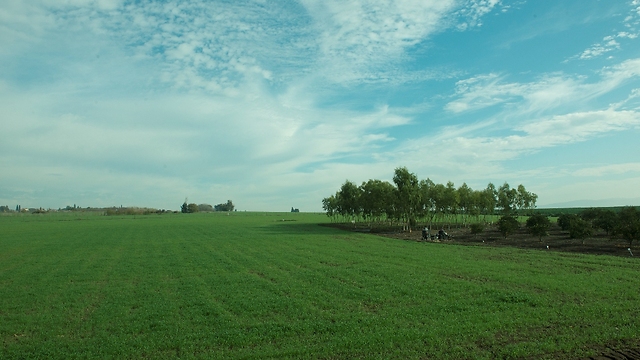
Will US imports uproot Israeli agriculture?
The United States is an agricultural powerhouse, able to export massive quantities of produce at low prices; Will a new trade agreement being negotiated over the coming days see this produce come to Israel? Will it destroy Israeli agriculture?
A high ranking delegation from the US Trade Commission will be speaking with Israeli government representatives in Jerusalem on Monday and Tuesday. They are expected to ask Israel to open up its markets to a wide range of US imports.
Though Agriculture Minister Uri Ariel (Bayit Yehudi) has already instructed his people to reject the American offer, high ranking officials in the Agriculture Wing of the ministry worry that Netanyahu will nevertheless greenlight the deal to begin importing massive amounts of US goods to Israel.
"If they decide to develop this trade deal with the US in a careless and uncontrolled manner – like what the Ministry of Economy is trying to do now – we can shut down Israeli agriculture right now," said Avshalom Vilan, Secretary General for the Israel Farmers Association.

"The volume of what the Americans are asking to export to us is staggering," continued Vilan. "Every trade deal that has been made has protected Israeli growers by making sure that the amounts allowed to be imported are minimal. This has been the Ministry of Agriculture's position. At this point, I believe that the prime minister should just sign us up to be the 51st state in America, because we've already given up our independence."
He argued that "the Americans are tougher than the rest of the world when it comes to someone asking to export something into the US that might threaten their farmers. It's strange that the Israeli government is rushing to eliminate the core Israeli asset of Israeli agriculture without any consideration."
Vilan also noted that during Operation Protective Edge, foreign ships did not dock at Israeli ports for 51 days, completely cutting Israel off from imports.
Director General of the Ministry of Agriculture, Shlomo Ben Eliyahu, expressed a different view, saying that Israel should not be against the deal, and that there should be a discussion about it.
An official statement from the Ministry of Agriculture said that "The dialogue between Israel and the United States on a free trade agreement is being conducted by the Ministry of Economy and the Prime Minister's Office. As for matters relating to agriculture, the Ministry of Agriculture is working to find the right balance between strengthening Israeli agriculture and increasing market competition. Everyone involved in the discussion is entitled to their own opinion, but the person who makes the final decision is the minister, with everyone else working according to the policies he puts forth."
The statement nevertheless stressed that "The delays to the agreement are being caused by the American side, because – as the Americans are telling us – they are also drafting agreements with other countries."
The Prime Minister's Office has yet to respond to requests for comment. However, the Ministry of Economy said that "The free trade agreement that was signed between the US and Israel waives the tariffs on most of the imports and exports between the two countries. The bi-lateral agreement regarding fresh and processed foods hasn't been updated in 20 years, while the last update concerning the trading of agricultural goods was in 2004. Preliminary discussions have been held on ways to increase the trade between the two countries. We are currently in discussions and working with the Ministry of Agriculture."










